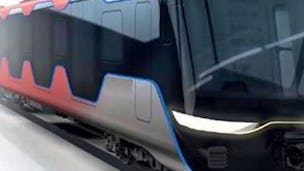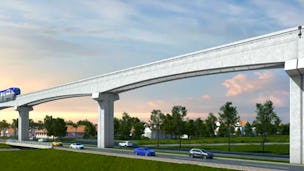This course has been created for Civil and Transportation Engineers. The "Planning of Metros " course is intended for entry level graduates, those who want to comprehend and navigate the concepts in planning of Metro rail systems. Throughout this course, participants will learn about the fundamental principles of Metro Rail planning in six modules. Tailored by industrial experts, this course is for the consumption of entry level Engineers in the Indian Subcontinent.

Planning of Metro Rail Systems
Ends soon: Gain next-level skills with Coursera Plus for $199 (regularly $399). Save now.

Planning of Metro Rail Systems
This course is part of Metro Rail Systems and Construction Specialization

Instructor: Subject Matter Expert
1,935 already enrolled
Included with
(17 reviews)
Recommended experience
What you'll learn
Gain insight into various Mass Rapid Transit Systems (MRTS) and the technologies they utilize, including trains, tracks, and control systems.
Discover Transit-Oriented Development's impact on urban planning via Indian city case studies, emphasizing MRTS integration.
Acknowledge MRTS's vital role: ease congestion, enhance connectivity, and foster sustainable urban growth in modern transport networks.
Skills you'll gain
Details to know

Add to your LinkedIn profile
6 assignments
See how employees at top companies are mastering in-demand skills

Build your subject-matter expertise
- Learn new concepts from industry experts
- Gain a foundational understanding of a subject or tool
- Develop job-relevant skills with hands-on projects
- Earn a shareable career certificate

There are 6 modules in this course
The "Introduction to Mass Rapid Transport Systems (MRTS)" module provides a comprehensive exploration of key topics essential to urban transportation. Encompassing the necessity of MRTS, Transit Oriented Development, feasibility studies, sustainable and smart technologies, and the historical evolution of metros, it equips learners with a holistic understanding of modern urban transit challenges and solutions.
What's included
9 videos1 assignment
The module on planning of metros covers essential principles for interface design, emphasizing Urban Planning intricacies, constraints, and restrictions. It explores the seamless integration of diverse metro systems and gives an overview of Building Information Modeling (BIM) for comprehensive planning. Students gain insights into optimizing metro functionality while navigating urban challenges and technological advancements
What's included
6 videos1 assignment
The module addressing elevated metro systems delves into the planning considerations involved in constructing elevated metro viaducts, encompassing aspects such as span configuration and foundation selection. Additionally, this module provides detailed insights into various techniques for erecting metro viaducts and explains the overall layout of metro stations.
What's included
11 videos1 assignment
The module focusing on underground metros provides an in-depth exploration of diverse methods employed in the construction of metro tunnels. It also offers a comprehensive overview of station layouts, with a particular emphasis on tunnel failures and safety considerations.
What's included
7 videos1 assignment
This module offers a comprehensive overview of critical components in metro systems. It covers HVAC systems, Tunnel ventilation systems, Public health engineering aspects, electric systems, Fire safety, alarms, prevention, and emergency response. Overall, the module provides a thorough understanding of the intricate systems and safety measures integral to the efficient functioning and well-being of metro systems.
What's included
7 videos1 assignment
This module, addressing Contracts, Quality Assurance, and Emerging Trends in Metro Systems, encompasses a detailed examination of FIDIC standards and the implementation of quality control measures in metro projects. Additionally, it explores futuristic technologies in transportation infrastructure, including Maglevs, Vactarian trains, Hyperloop, and the advent of flying taxis.
What's included
12 videos1 assignment
Earn a career certificate
Add this credential to your LinkedIn profile, resume, or CV. Share it on social media and in your performance review.
Instructor

Offered by
Explore more from Environmental Science and Sustainability

L&T EduTech

L&T EduTech
Why people choose Coursera for their career




Learner reviews
17 reviews
- 5 stars
76.47%
- 4 stars
11.76%
- 3 stars
5.88%
- 2 stars
5.88%
- 1 star
0%
Showing 3 of 17
Reviewed on Mar 26, 2025
it was good but i am not going to get certificate without payment although i have enrolled myself
Frequently asked questions
To access the course materials, assignments and to earn a Certificate, you will need to purchase the Certificate experience when you enroll in a course. You can try a Free Trial instead, or apply for Financial Aid. The course may offer 'Full Course, No Certificate' instead. This option lets you see all course materials, submit required assessments, and get a final grade. This also means that you will not be able to purchase a Certificate experience.
When you enroll in the course, you get access to all of the courses in the Specialization, and you earn a certificate when you complete the work. Your electronic Certificate will be added to your Accomplishments page - from there, you can print your Certificate or add it to your LinkedIn profile.
Yes. In select learning programs, you can apply for financial aid or a scholarship if you can’t afford the enrollment fee. If fin aid or scholarship is available for your learning program selection, you’ll find a link to apply on the description page.
More questions
Financial aid available,





